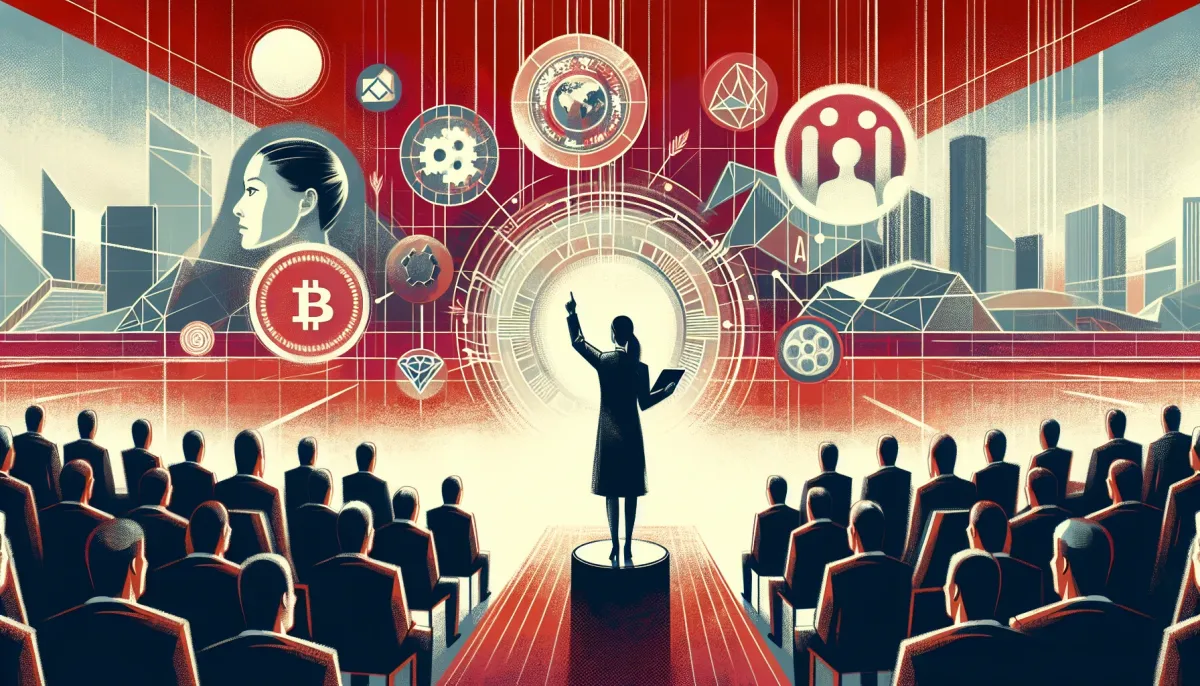Davos 2025 was an exciting event focused on AI, blockchain, and quantum technologies. Over five days, I had the chance to meet CEOs, heads of state, and experts in these fields.
I shared my insights on blockchain and AI through more than ten keynotes, panels, and podcasts. Each conversation was a valuable exchange of ideas.
The depth of knowledge was impressive. There was a strong desire to work together on global issues, from promoting economic freedom through crypto to developing ethical governance for AI.
The integration of blockchain and AI stood out. These technologies complement each other, combining trust and intelligence to transform various industries.
Here are the top 13 takeaways from Davos 2025, covering blockchain, AI, Web3, and the vital role of women in leadership.
Blockchain, Crypto, and Web3: Establishing Trust
1. Crypto Investment Is Accelerating. Corporate leaders from different sectors—banks, asset managers, and payment companies—made it clear: crypto adoption is rising fast. It’s no longer just a niche market. Cryptocurrency is now a key part of financial strategies.
2. Emerging Markets See Crypto as a Growth Catalyst. Leaders from developing economies highlighted how crypto can drive economic freedom and growth. These regions often struggle with outdated financial systems. They see blockchain and decentralized finance as a way to leapfrog traditional infrastructure.
3. Blockchain and AI: A Synergistic Relationship. Throughout the conference, the partnership between blockchain and AI was a hot topic. As fintech leader Efi Pylarinou pointed out, blockchain provides the trust needed for AI decisions, while AI enhances blockchain’s efficiency. This collaboration is opening new doors across various sectors.
At the DavosWeb3 Summit, a new Davos Declaration for blockchain was signed by key companies, led by Ajeet Khurana, to promote a commitment to the new internet.
4. Blockchain Secures AI and Data. Discussions on decentralized AI emphasized how crucial blockchain will be in the next phase of AI adoption. Its ability to provide trust and data integrity is essential for securing AI systems.
5. Tokenized Real-World Assets (RWAs) Are Here. I met the founder of the first tokenized building. This project shows how blockchain is changing real estate. It allows for fractional ownership and improves transparency. Stan Stalnaker, CEO of Hub Culture, noted that this is a glimpse into how blockchain can unlock real-world assets for global investors.
During a panel on RWAs, Betsabe Botaitis, CFO of Hedera, stated that RWAs represent a significant step for blockchain technology. They bridge digital and physical economies, promoting liquidity and accessibility.
6. Political Influence on Crypto Markets. Discussions about Donald Trump's impact on the crypto market highlighted the connection between politics and blockchain innovation. Even though he participated virtually, his policies were felt strongly.
AI: Shaping Our Future
7. AI Agents Are Becoming Ubiquitous. AI agents were a major topic of discussion. OpenAI's "Operator" showcased what’s coming. These agents will soon manage tasks like booking flights and ordering groceries. They’re expected to become as common as smartphones within a year.
8. AI and Robotics Transform Leadership. AI and robotics are changing leadership roles. Traditional management structures are evolving as AI takes over routine tasks. Future leaders will need to focus on emotional intelligence and ethical decision-making, where humans still have the advantage.
9. Governance Is Key to AI's Potential. Trust and governance were central themes. Without strong governance, the promise of AI cannot be fully realized. Leaders emphasized the need for secure, ethical AI systems that align with societal values.
Navrina Singh, Founder and CEO of Credo AI, pointed out that our future with AI depends on evolving responsibly, with governance and trust as our foundation.
10. From Infrastructure to AI Applications. Conversations about AI have shifted from building infrastructure to focusing on applications that enhance creativity and solve global problems. This highlights AI’s role as a driver of innovation.
11. FOBO (Fear of Becoming Obsolete) Is a Concern. The rapid pace of AI advancement has sparked discussions about FOBO. As tools become better than humans at many tasks, people are rethinking their roles and adaptability. Some see this as a challenge, while others view it as an opportunity to prioritize AI literacy.
12. DeepSeek: A Surprising AI Development. American AI firms are on alert after a Chinese hedge fund unveiled DeepSeek, an impressive AI model developed at a lower cost than those by companies like OpenAI and Meta. This highlights the growing global competition in AI innovation.
DeepSeek optimized low-level code for efficiency and selectively trained active tokens, significantly reducing costs. Despite export restrictions, the U.S. remains competitive in AI due to its strong resources and incremental innovations.
Celebrating Women's Leadership at Davos
13. Highlighting Women’s Leadership. The 100 Women @Davos session, founded by Dr. Anino Emuwa, was a standout moment. It showcased the leadership and innovation women bring to various industries. These leaders shared stories of overcoming barriers and driving change.
Dr. Anino emphasized that the 100 Women of Davos celebrates women’s leadership and impact, fostering meaningful change and building a more inclusive future.
Davos 2025 demonstrated global collaboration and innovative thinking in AI and blockchain. Whether discussing crypto's potential to empower emerging markets or AI's ability to enhance creativity, one message was clear: the future relies on responsible collaboration.

